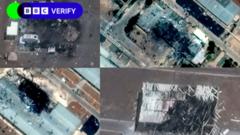The conflict has led to casualties on both sides and ignited concerns over the potential for further international involvement.
**Escalation Unfolds: Israel and Iran Engage in Prolonged Conflict Amidst Widespread Attacks**

**Escalation Unfolds: Israel and Iran Engage in Prolonged Conflict Amidst Widespread Attacks**
Fears of a larger regional war grow after a significant escalation in attacks between Israel and Iran, targeting key military and oil facilities.
The situation in the Middle East escalated dramatically on June 14, 2025, as Israel and Iran exchanged heavy fire, leading to extensive airstrikes that targeted key military and infrastructure sites. The attacks drew international condemnation and heightened fears of a broader regional conflict that could involve major powers.
In a significant escalation, Israeli forces bombed several targets in Tehran, including facilities linked to Iran’s nuclear program and critical oil installations. Reports indicated that the Shahran fuel depot in Tehran was set ablaze during the assault, causing massive explosions that prompted evacuations and emergency responses. Observers from surrounding areas described the blasts as feeling similar to earthquakes, further amplifying the atmosphere of chaos and fear.
As firefighting efforts commenced in Tehran, dark smoke enveloped the sky, marking a visible sign of the conflict's intensification. Back in Israel, Iranian missile attacks targeted various locations, including historic cities like Tel Aviv and Rishon LeZion, leading to significant civilian casualties, including fatalities among residents.
The ongoing military actions on both sides reflect a vicious cycle of retaliatory strikes. Israeli air defense systems intercepted multiple Iranian missiles; yet, Iran's retaliatory missile barrage resulted in severe property damage and loss of life around key Israeli urban centers. Observers noted that the conflict had reached unprecedented levels of violence that echoed earlier regional tensions.
Israeli military spokespersons asserted that their operations had reached new depths within Iranian territory, labeling the assaults as a response to persistent threats from Iran against Israeli civilians. Meanwhile, Iranian officials vowed they would respond decisively to these strikes, blaming Israel for civilian casualties and promising their own retaliation.
In conjunction with these military exchanges, diplomatic dialogues have faltered, with previous talks regarding Iran's nuclear program being abandoned amidst the turmoil. Leaders from both nations continue to escalate their rhetoric, implying that if the conflict persists, it may draw in international stakeholders, including the United States.
As the fallout from this crisis continues, the humanitarian consequences are becoming increasingly dire, affecting civilians caught in the crossfire in both nations. Analysts warn this conflict could further destabilize the entire region, complicating efforts for peace and escalating tensions that could spiral out of control.
The broader implications of military action against Iran's energy infrastructure are troubling. With Iranian energy production crucial to its economy, strikes targeting oil and gas facilities raise serious concerns about economic repercussions and the potential for a wider conflict impacting global energy markets. As the situation evolves, the world watches closely, hoping for a path away from further escalation and instability.
In a significant escalation, Israeli forces bombed several targets in Tehran, including facilities linked to Iran’s nuclear program and critical oil installations. Reports indicated that the Shahran fuel depot in Tehran was set ablaze during the assault, causing massive explosions that prompted evacuations and emergency responses. Observers from surrounding areas described the blasts as feeling similar to earthquakes, further amplifying the atmosphere of chaos and fear.
As firefighting efforts commenced in Tehran, dark smoke enveloped the sky, marking a visible sign of the conflict's intensification. Back in Israel, Iranian missile attacks targeted various locations, including historic cities like Tel Aviv and Rishon LeZion, leading to significant civilian casualties, including fatalities among residents.
The ongoing military actions on both sides reflect a vicious cycle of retaliatory strikes. Israeli air defense systems intercepted multiple Iranian missiles; yet, Iran's retaliatory missile barrage resulted in severe property damage and loss of life around key Israeli urban centers. Observers noted that the conflict had reached unprecedented levels of violence that echoed earlier regional tensions.
Israeli military spokespersons asserted that their operations had reached new depths within Iranian territory, labeling the assaults as a response to persistent threats from Iran against Israeli civilians. Meanwhile, Iranian officials vowed they would respond decisively to these strikes, blaming Israel for civilian casualties and promising their own retaliation.
In conjunction with these military exchanges, diplomatic dialogues have faltered, with previous talks regarding Iran's nuclear program being abandoned amidst the turmoil. Leaders from both nations continue to escalate their rhetoric, implying that if the conflict persists, it may draw in international stakeholders, including the United States.
As the fallout from this crisis continues, the humanitarian consequences are becoming increasingly dire, affecting civilians caught in the crossfire in both nations. Analysts warn this conflict could further destabilize the entire region, complicating efforts for peace and escalating tensions that could spiral out of control.
The broader implications of military action against Iran's energy infrastructure are troubling. With Iranian energy production crucial to its economy, strikes targeting oil and gas facilities raise serious concerns about economic repercussions and the potential for a wider conflict impacting global energy markets. As the situation evolves, the world watches closely, hoping for a path away from further escalation and instability.



















